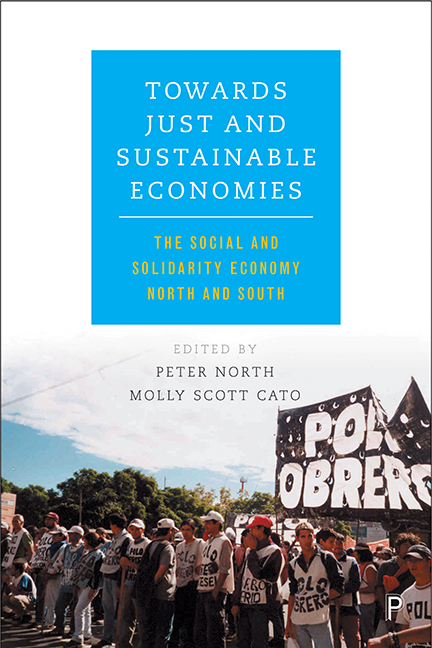Book contents
- Frontmatter
- Dedication
- Contents
- List of figures and tables
- Notes on contributors
- Acknowledgements
- One Introduction: new economies North and South – sharing the transition to a just and sustainable future
- Part I Theoretical perspectives on the social and solidarity economy
- Part II The social and solidarity economy as a site of social innovation
- Part III The social and solidarity economy and the state
- Part IV Policy translation between North and South
- Index
Eight - The role of universities in the sustainable evolution of solidarity economies
Published online by Cambridge University Press: 05 April 2022
- Frontmatter
- Dedication
- Contents
- List of figures and tables
- Notes on contributors
- Acknowledgements
- One Introduction: new economies North and South – sharing the transition to a just and sustainable future
- Part I Theoretical perspectives on the social and solidarity economy
- Part II The social and solidarity economy as a site of social innovation
- Part III The social and solidarity economy and the state
- Part IV Policy translation between North and South
- Index
Summary
Introduction
Colleges and universities must be learning centres for new ideas and for change, offering guidance to other sectors that have the potential to serve as societal models. Contact with the everyday life of communities benefits students. This chapter analyses how the solidarity economy (SE) movement supports the development of citizenship awareness among students, discusses the socio-educational patterns presented by a community during the process of SE implementation, and shows how a university can accelerate the process whereby individuals and groups become involved in solidarity economy movements.
This chapter reports and reflects on a three-year initiative at the Methodist University of São Paulo that gathered students, professors and lecturers to support a local solidarity economy group from Montanhão in the São Bernardo do Campo district, a poor Brazilian community located in the ABC region, seven outskirt cities of São Paulo's Metropolitan area. Action research was the methodology applied, offering programmes and management tools, enhancing the community's social technologies repertoire and highlighting cultural and local knowledge in order to create the necessary conditions for sustainable local development, incorporating the principles of solidarity economy. The chapter discusses first how the university worked with community-based entrepreneurs to support them in the development of their businesses, before analysing the impact of a community bank and a social currency scheme on the entrepreneurs’ experiences. In light of the results obtained, a paradigmatic shift is proposed, with a focus on mapping the social, environmental and economic relationships in the area, and bringing a sustainability perspective to the solidarity economy.
Poverty and the solidarity economy
An understanding of social inequality and poverty is essential to an analysis of the solidarity economy in Brazil. Inequality has been one of the consequences of the capitalist economy – especially in peripheral occidental capitalist countries – and this has become even more significant as a result of globalisation processes characterised by the destruction of economic regulations, the opening up of markets to external funding, and the reliance of local governments on international capital (Pochmann, 2005). During recent decades, the globalised economy has generated a multitude of economic crises, and the 1990s crisis changed productive processes and provoked unemployment, social inequality and the exclusion of entire classes from Brazil's formal economy. Job quality also changed as a result of company reorganisations and a continuing process of outsourcing.
- Type
- Chapter
- Information
- Towards Just and Sustainable EconomiesThe Social and Solidarity Economy North and South, pp. 135 - 154Publisher: Bristol University PressPrint publication year: 2017

